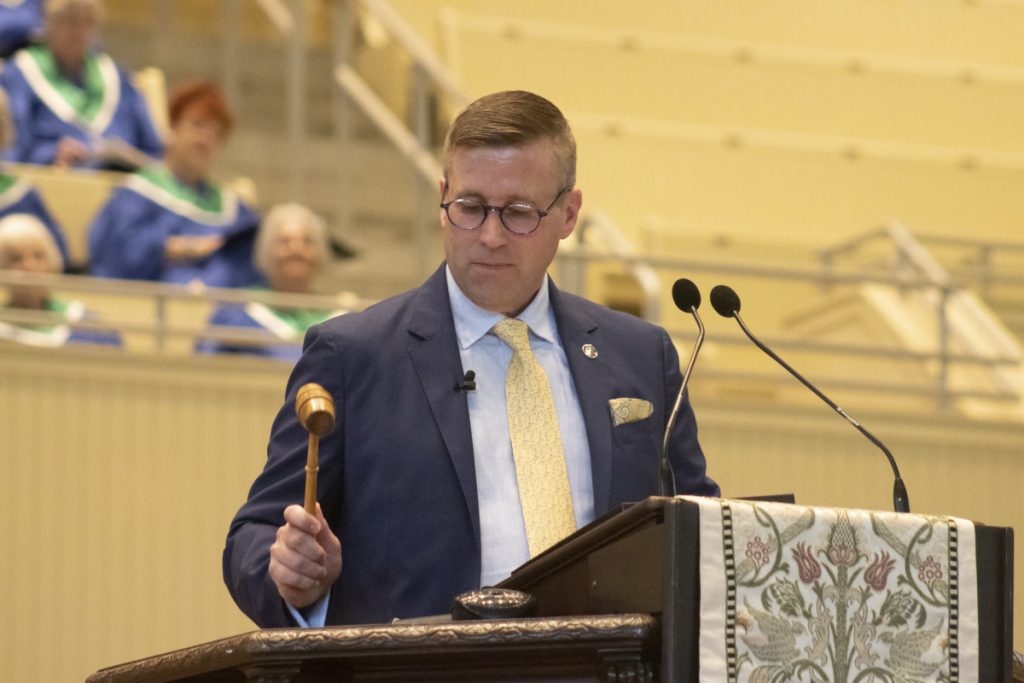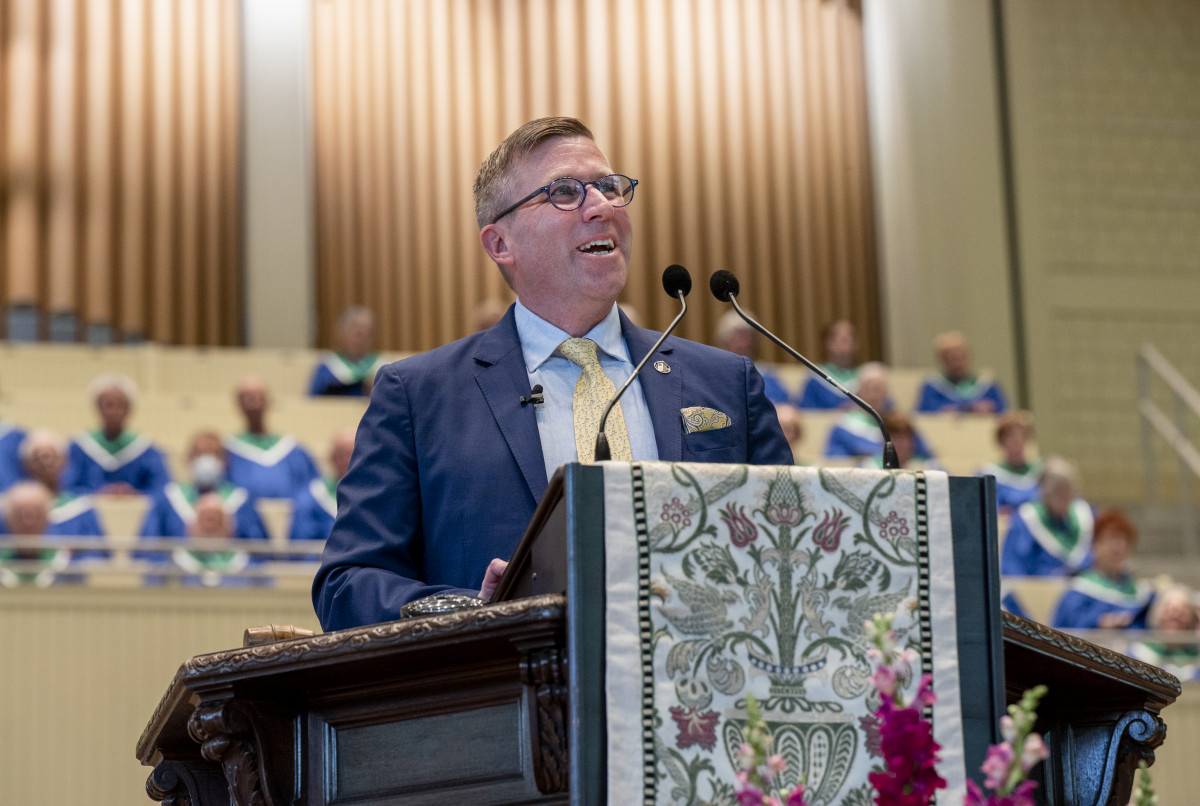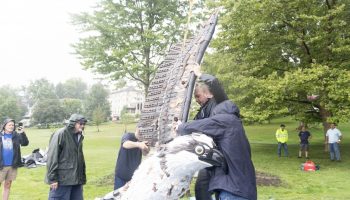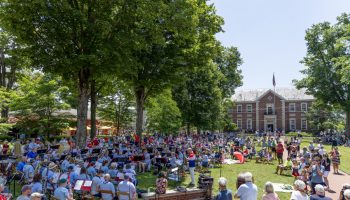Good morning. It has been much too long since we’ve gathered as a full community in this space and in this sacred place. I offer our returning Chautauquans a hearty welcome home. It is definitely not Chautauqua without you. And it’s absolutely wonderful to see you again.
To those with us visiting Chautauqua for the first time this morning, we want to offer you an extra special greeting. You are now part of a community that cherishes lifelong learning as a key to perpetuating and enhancing our democratic society. Our mission calls us to constantly widen our circle, and your presence here affirms we are fulfilling that commitment. We hope your experience with us is the beginning of a long and enriching friendship, and we are so very glad that you are here.
On a personal note, I’d like to welcome two very special guests to the Amphitheater this morning. Many of you know I have served as a trustee of my alma mater, St. Bonaventure University, having concluded my term just a few weeks ago. Today, perhaps as my last official act as a trustee, I want to welcome St. Bonaventure’s 22nd President, Dr. Jeff Gingerich, who took office just this week to Chautauqua for the first time. Dr. Gingerich, it’s a joy to have you and Betsy join Peter and me today. May this be the first of many visits to Chautauqua, and I look forward to your leadership in our region.
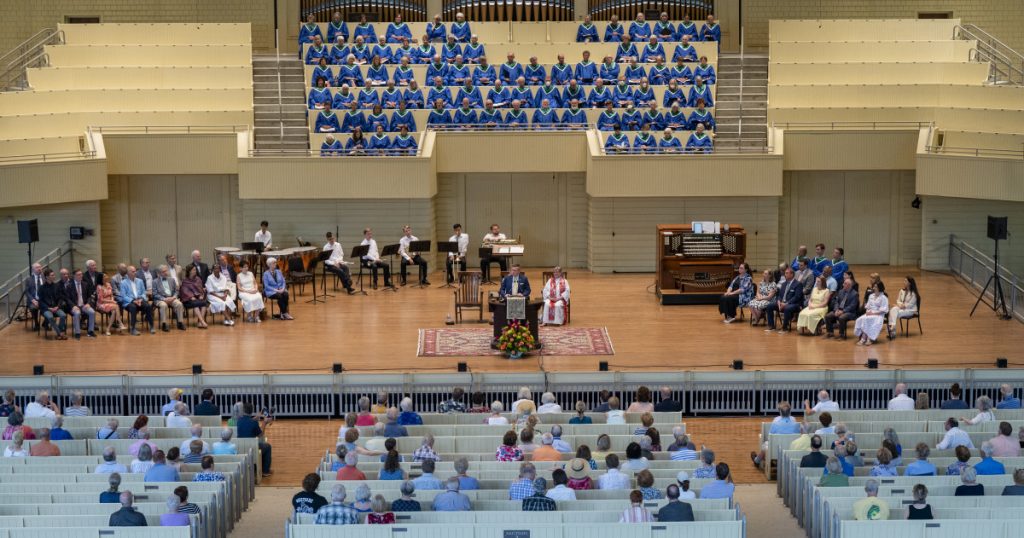
Chautauquans have gathered like this — on the first Sunday of the Summer Assembly — for more than a century. The opening message delivered by the Institution’s president is a tradition that dates to our founding in 1874. This is our opportunity to set the stage for the Summer Assembly; to establish the context in which we will convene the forthcoming conversations and experiences; and to create a space of belonging for every person here — and not yet here — each summer. It is one of our most important rituals in a place that reveres both its traditions and pushes constantly to innovate.
I want to thank the Board of Trustees, many of whom are seated here on the stage to my right, our executive team also seated here to my left, the Board of Directors of the Chautauqua Foundation, and our year-round and seasonal staff. Without the collective efforts of these teams, none of this would be possible. Please join me in thanking them.
Earthquakes and Aftershocks
I’m struck today that it has taken Chautauqua three long years to return to our 2019 levels of activity. In 2020, we conducted our programming entirely online. Last year, we opened our Assembly in a hybrid mode and did not open up the grounds completely. And here we are, in year three, finally reopening Norton Hall and Bratton Theater, operating our schools at full capacity and at the same time, and countless other examples of programs and activities that were last fully present in 2019.
Trauma is a complicated thing. Sometimes an initial incident is not the most damaging. As we gather today, we acknowledge the seismic shifts that have occurred in our families, our communities, our economy and our nation as a whole. The normal culprit of seismic shifts is an earthquake. Of course, for most of us, the shifts we have experienced over the past three years are only metaphorically seismic – yet the consequences are nonetheless tragic.
Anyone who has worked with earthquake victims will tell you that it’s the aftershocks that are most difficult to manage. Aftershocks create continuing uncertainty following a natural disaster – they spawn waves of terror as we mere humans are reminded time and time again how little control we have over the course of things. The core of the earth is wielding its power. Charles Darwin explained it this way:
“An earthquake … at once destroys the oldest associations; the world, the very emblem of all that is solid, moves beneath our feet like a crust over a fluid; one second of time conveys to the mind a strange idea of insecurity, which hours of reflection would never create.”
When we truly sit with this “strange idea of insecurity,” we can gain dimensional insight into the state of our world today and of ourselves — and our resulting disheveled, impatient, or even impetuous dispositions. The COVID-19 pandemic was the earthquake; death and grave illness followed, creating multitudes of aftershocks across families, communities, and nations. Mix in political rancor; a historic transfer of presidential power in the United States; vaccines offering promise, only to be followed by yet more shocks: new strains of the virus; war in Ukraine; economic uncertainty; the housing crisis; inflation; historic Supreme Court decisions; and racially motivated mass shootings, as nearby as our neighbors in Buffalo.
The impact of any one of these tragedies would, understandably, cause decades-long, even generational, reverberations. Seen as a collective — they call this community of seekers and learners to take a breath, to pause to regain some perspective, but only for a moment, recognizing that our work is not to ponder for pondering’s sake but to recenter ourselves to make a difference in the world.
This summer, we will do just that: pause for a moment to take stock, with the help of a familiar, uniquely Chautauquan device: our weekly themes. We’ll convene critical conversations about America’s role in the world; reconnecting with the natural world; the future of human rights; the future of history; the vote and democracy, and more.
And, amid this environment of uncertainty, we’ll also explore that which feeds the human spirit in good times and otherwise. Our foundation of faith is the awesome core of Chautauqua’s being. It is ever expanding to encompass the growing, increasingly diverse communities that celebrate the goodness of God and creation across traditions — including those that align with no faith tradition. This core can be shaken and rattled, for sure, but is not broken.
We’ll ask questions on our interfaith platform that explore America’s global conscience; the spirituality of human rights; and that never-ending question of the future of being. We will examine courage; and celebrate the power of creativity, culture and faith.
And, of course, we’ll again leverage the arts as the great convener of the most difficult and complex conversations. Literature, the visual arts, musical offerings, the power of opera and theater all draw us in and illuminate as no other experience can. Sometimes the reality of a situation is just too difficult to take in through a lecture or a conversation; once again our artists will call us to an intentional discomfort or a reflective balm we need to even take our first steps toward processing.
We will also create spaces for relaxation and recreation — often the most important keys to unlock our minds and remove mental barriers.
This interdisciplinary approach, practiced and pursued by a multigenerational audience, is the magic of Chautauqua. How lucky are we to have the time and space to immerse ourselves in this pursuit?
Aftershocks and Gratitude
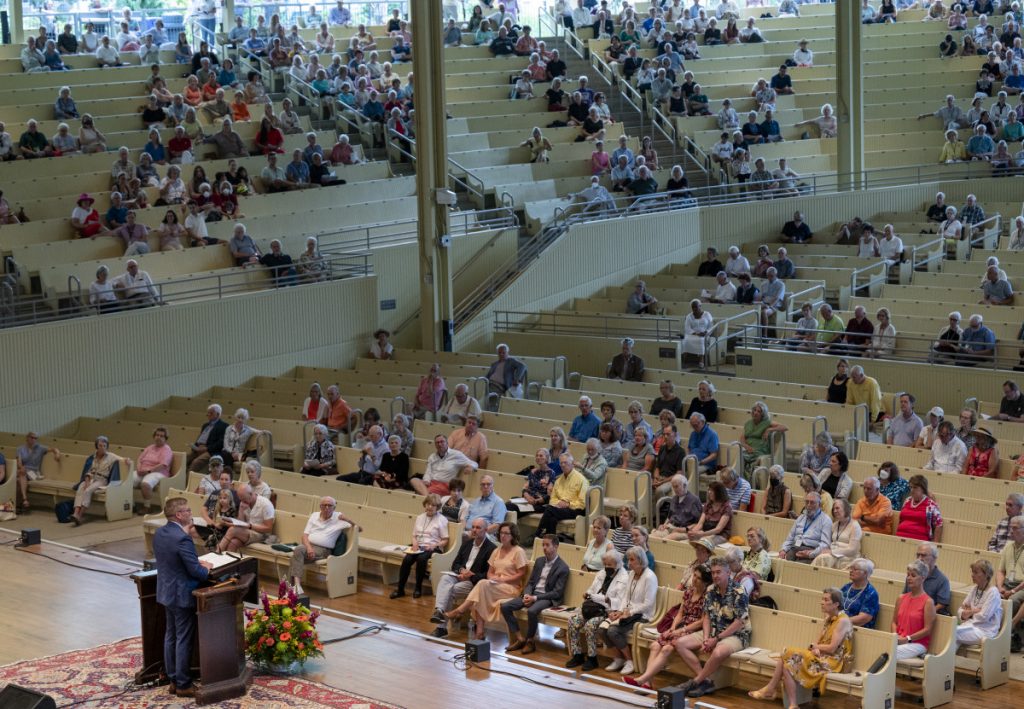
But what do we do when our summer concludes each year? We know it’s not enough to seek perspective for a finite period of time when the world’s aftershocks seem bent on knocking us down repeatedly.
The even greater context in which this work takes place is Chautauqua’s vision for the future, as articulated in our strategic plan, 150 Forward. When this plan was conceived and confirmed in the spring of 2019 — which feels like a decade ago — we had no idea how prescient its principles would be. Our plan calls for us to lean into this work we do each summer as a springboard to bringing our calling and mission to the world 12 months of the year. 150 Forward is more than a roadmap for organizational health: it seeks to provide anchors to guard against the aftershocks themselves. Think about what it asks us:
1) How does our Summer Assembly become a model against the polarization that infects our body politic? How does it harness goodness and joy as antidotes to fear and loathing of the other?
2) How do we take the very idea of a “retreat,” of this magical place and its founding mission, out into our own communities? How do we think about working across our disciplines and across our generations to celebrate that no one group has the answer?
3) What does it look like to harness science — which at one point was not a political issue but a genuine pursuit of facts and trends and data — to clean up a lake that is central to Chautauqua’s existence? And if we can do it here, why can’t we transport our learnings to help other freshwater bodies heal not only what’s inside the water but perhaps heal our increasingly inhospitable climate?
4) And can we be bold enough, as our founders were, to reinvent the very way we convene and create a model that ensures that the reasons you and I gather here today are sustainable and replicable and generate a new spirit of hope for generations to come?
These questions that undergird our strategic approach to Chautauqua’s future are coupled with our imperatives to mobilize technology across all operations; to create strategic partnerships that add value and diversity to Chautauqua’s programming; to conceive and implement creative labor and talent solutions; and to create the conditions in which everyone feels that they can engage as full and valued participants in the Chautauqua experience, through investments of time and other resources into a comprehensive plan for inclusion, diversity, equity and accessibility.
I hope you’ll see this larger vision coming to life this summer in countless ways. The gift of the past two years for Chautauqua is this: the multiple, intertwined struggles and challenges only served to reinforce the importance of our plan – which was conceived to assure the vibrancy and relevance of this community for current and future generations – regardless of the forces and aftershocks of our bruised and battered world. As we look toward our 150th birthday in 2024:
• 150 Forward has helped us to see our role in creating year-round conversations on climate change.
• It has clarified our calling to be a key leader in this region on the development of science to inform Chautauqua Lake conservation plans and strategy, and has us dreaming about how restoring our lake might allow us to help others.
• It has reinforced the importance of the Summer Assembly — our mission to convene in community to explore the challenging issues of the day so we can empower every person here and not yet here to be positive forces for change through the democratic process.
• It has reminded us that our founders — Lewis Miller and John Heyl Vincent, a businessman and a bishop — knew that Chautauqua could not and should not be contained to these sacred grounds and this summer season. The world needed Chautauqua in 1874 and it needs it now more than ever, 12 months of the year. Embracing this part of our calling has also illuminated the need to establish facilities and attractions that fuel our 12-month vision; bringing to life a master plan that imagines our presence along Route 394 as a corridor for commerce and engagement, and in the process, declares that we have a role to play in rebuilding our regional economy.
The first step toward this vision is coming to life as we speak, with the construction of a new Buildings and Grounds facility underway at the back of the “green” parking lot along Route 33. While out of sight from the main gates of our grounds, this facility will not only finally create a professional and fitting workspace for those who care for, build and re-build our beloved grounds, but it also frees up space and facilities along Route 394 that we will leverage for programming, hospitality and commerce. In this way, Chautauqua has the opportunity to play an increasingly transformational role in Chautauqua County’s economic vision for the future, elevating education and tourism as economic drivers in this part of the county all year-round. This Institution has doubled down on its commitment to turn our gates into gateways of promise and opportunity, and we’re on the road toward doing just that!
150 Forward also reminds us that we have deep, meaningful and difficult work to do in shifting our own core to become a place where every person truly belongs here — and wherever Chautauqua is. As one writer reminded us over the past year, we need to stop asking ourselves what we are doing to achieve a more diverse and inclusive community. The more important question is this: What are we doing that keeps us where we are; that makes this place and this movement inaccessible or unwelcoming to those who have yet to discover it? Amit Taneja, our Chief Inclusion, Diversity, Equity and Accessibility Officer, is leading us through the important process of raising and answering this question and carving solutions that will create that necessary shift. These are difficult but absolutely existential conversations. We are asking you to be part of this work here and in your home communities. You will find our plan at IDEA.chq.org, and Amit will be hosting listening sessions and conversations across the grounds this season. Please attend and engage with him on ways you can support these efforts.
A group of Chautauquans are also helping us to model a different path toward dialogue — to show that it is possible for us to stay in conversation with those we agree with and those we do not agree with. You will notice an enhanced focus on our Chautauqua Dialogues program this season, and I encourage you to participate in those conversations when possible. It is programs like Chautauqua Dialogues that add to our sense of community, and much of it would not be possible without the partnership of our staff and committed volunteers who make these dialogues happen.
Our plan also nudged us into the digital space — to create a digital grounds, so to speak, that has become a new foundation onto which we can build out our vision for the future. CHQ Assembly is a central and exciting innovation space, where we will continue to morph and evolve as the digital world evolves. It will help us to continue to build muscles of agility and experimentation — not to replace this extraordinary physical space and face-to-face engagement experience — but to sustain it and enhance its reach and relevance.
While CHQ Assembly does this very “front-facing” work, we are also building a new technological foundation and infrastructure that will finally enable us to overcome challenges we’ve endured for decades; challenges that have impaired your experiences at ticketing, gates, class and youth registration; that have hobbled our human resources, communication and marketing efforts and effectiveness, despite the very good and committed efforts of professionals who have somehow worked miracles to “make do.” 150 Forward calls us to acknowledge and address our technology deficit as a critical capacity builder for the future, and reminds us that technology need not be just a piece of overhead, but rather can and must be an amplifier of our mission in ways our founders never dreamed.
You are also seeing Chautauqua lead through dramatically shifting expectations of how and where work is done. We know that what has always made Chautauqua special is the people that animate it with their own unique gifts and talents. We continue to seek ways to bring the very best minds to our team so we can deliver the very best for you. Our presence in Washington, D.C., our renewed commitment to attract and recruit talent to Western New York, and our own openness to what a new generation is telling us about the nature of work has one common goal: The best minds should be put to work for Chautauqua’s mission. It demands nothing less.
And, so, I hope you can see: Amid the shocks and tremors of the day, we find extraordinary grace and gratitude in Chautauqua’s mission — that which transcends while transforming fear into action; hate into empathy; loss into meaning. At Chautauqua we ask questions not for the sake of questions, but because we know that to have the courage to seek the answers gives meaning to life. And when we discover new meaning, anything is possible.
So what is our charge to you, dear Chautauquans, as we begin this summer together? Perhaps it can be best summed up by two of our country’s leading minds today — one an avowed conservative and the other an unabashed liberal. Robert George and Cornell West remind us:
“We need the honesty and courage to consider with an open mind and heart points of view that challenge our own beliefs — even our deepest, most cherished identity-forming beliefs. We need the intellectual humility to recognize our own fallibility — and that, too requires honesty and courage. We need the honesty and courage to treat decent and honest people with whom we disagree — even on the most consequential questions — as partners in truth-seeking and fellow citizens, not as enemies to be destroyed.”
I would suggest that we cannot wait until Week Eight, when we explore “New Profiles in Courage,” to marshal the honesty and courage to do this work. May we bring an open mind and heart to this shared conversation. May we bring the best of ourselves to this work. We do this, as we always have at Chautauqua, together in community; and we will and must persist.
For those who are new to Chautauqua, there is a tradition that declares that the Summer Assembly is not officially convened until the three taps from this historic gavel. It certainly adds to the Brigadoon-like spirit of the place. Chautauqua doesn’t begin until the taps happen. Or perhaps it is better framed this way: Our summer of asking questions and seeking meaning, our summer of honesty, courage, open hearts and minds, begins after the echo of the third tap and reverberates, if we’re lucky, for generations to come.
I tap the gavel three times.
Chautauqua 2022 has begun.
